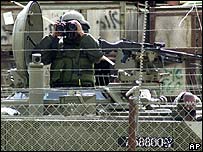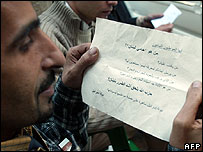
Israel guards its border with Lebanon very closely
|
Israeli troops have clashed with Hezbollah guerrillas at the Lebanese border after an Israeli strayed across in a paraglider or parachute.
Reports say the Israeli was a civilian who did not intend to enter Lebanon.
No injuries were reported in the incident. There is dispute about whether Israeli troops entered Lebanon.
The clash took place after Israeli planes dropped thousands of leaflets over the Lebanese cities accusing Hezbollah of "harming Lebanon".
"Hezbollah is causing enormous harm to Lebanon. Who lies to you?, Who is the tool in the hand of his Syrian and Iranian masters?," the leaflets said.
The material was also dropped over Beirut and several towns in the Hezbollah stronghold of southern Lebanon.
Violent clashes between Lebanese guerrillas and Israeli troops have erupted in the border area this week. Hezbollah fighters launched a major assault on Israeli army posts, triggering retaliatory air strikes.
The material - written in Arabic - also said Israel was determined to protect its citizens. The leaflets were signed "The State of Israel".
Hezbollah spokesman Mohammed Afif told the Associated Press news agency the leaflets were "an expression of Israeli failures in facing Hezbollah".
Reda Nemeh, a 41-year-old Lebanese taxi driver who saw the leaflets said: "The Israelis want to sow strife among the Lebanese and terrorise them."
"This should make us protect the resistance," he added.
Israel has carried out similar leaflet drops after past clashes with Hezbollah, but such material has rarely been dropped so close to the centre of the Lebanese capital.
New violence
Four Hezbollah fighters were killed by Israeli troops during an attack on Monday in the disputed Shebaa Farms area that also left 11 Israelis wounded.
Israeli warplanes bombed suspected Hezbollah targets in southern Lebanon in retaliation on Tuesday.

Many Lebanese were unimpressed with the leaflets
|
Defence Minister Shaul Mofaz says Israel was conducting its most extensive response to Hezbollah attacks since its forces left Lebanon in 2000.
The UN has blamed Hezbollah for provoking the violence.
Hezbollah conducts sporadic operations against Israeli troops in the Shebaa Farms area, which it and the Lebanese government say should have been included in the Israeli withdrawal in 2000.
The water-rich Shebaa Farms lie at the convergence of Israeli, Lebanese and Syrian territory.
They were captured by Israel from Syria in 1967 but the area is now claimed by Lebanon, with Syrian backing.
Israel - backed by the United Nations - maintains the water-rich zone was captured from Syria in 1967 and its fate should be determined via talks with Syria.

